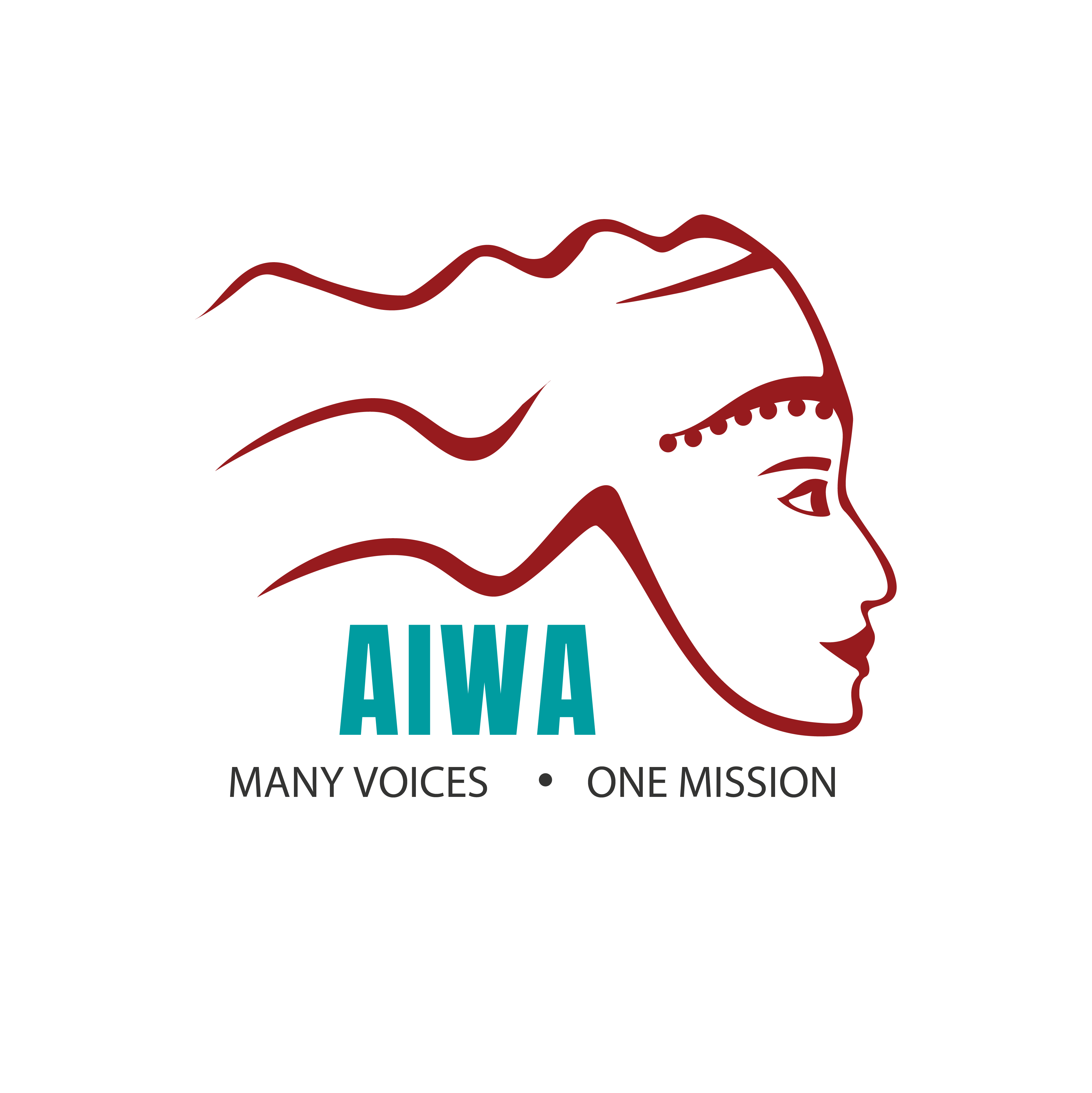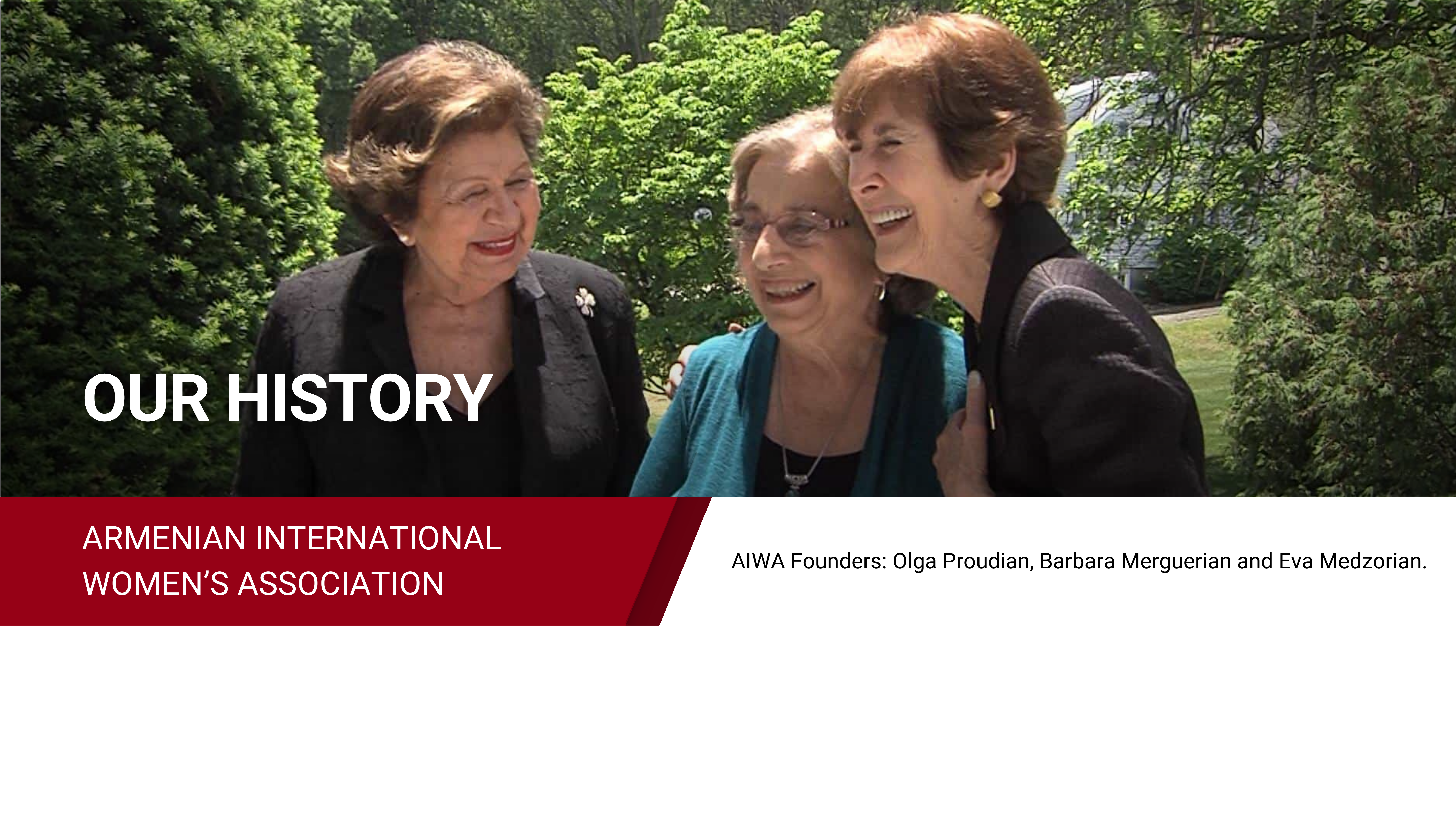The founders of AIWA recognized the opportunity for Armenian women to play a significant role in their countries, their organizations, and their communities.
AIWA's Story
The First Decade: Laying the Foundations
AIWA was established in the aftermath of the catastrophic 1988 earthquake and massive independence campaign in Armenia and in the shadow of the women’s movement in the United States. Three women – Eva Medzorian, Barbara Merguerian, and Olga Proudian – all living in the Boston area, different in backgrounds, interests, and personalities, came together in a common realization that the time had come for Armenian women to become more closely involved in our communities. We were not aware of a single Armenian independent, nonpolitical, non-sectarian organization run by women and devoted to the particular interests and concerns of women. Thus, after a series of meeting during 1990, culminating in a symposium at Wellesley College in December of that year, the Armenian International Women’s Association was officially incorporated in the Commonwealth of Massachusetts in March, 1991. With bringing Armenian women together a primary goal, we explored diverse programs at first. At the Wellesley College Symposium we had met Judge Y. Gladys Barsamian, of the Wayne County Michigan Probate Court, and Sara Harder, of the Women’s Consortium at the University of Wisconsin Au-Clair. A Health Care Forum attracted a large audience. We also enjoyed social events; an evening with comedienne Andrea Martin, accompanied by pianist Al Vega, was a major hit. A key networking tool was not long in appearing; under the capable direction of Alice K. Mirak, our first directory was published in 1992: Armenian Women at Work, in Business, the Professions, Community Service, and the Arts. Publication of the AIWA Newsletter had already commenced in 1991.
The difficult conditions faced by our sisters and their families in Armenia during the 1990’s could not escape our attention, and many informational sessions about life in Armenia were organized. The neglect of women’s health issues in Armenia over a period of years was striking, leading to AIWA’s first major initiative in Yerevan — support for a program to enable top doctors from Harvard Medical School to travel to Yerevan to train medical personnel at the Women’s Reproductive Health Center there. The doctors were willing to donate their time, but funds were needed for their travel costs. AIWA’s early efforts in Armenia earned us an award for humanitarian assistance from the First Lady of Armenia, Lucia Ter Petrossian when she visited the Boston area in 1994.
An AIWA Luncheon honoring Armenia’s first Ambassador to the United States, Rouben Shugarian, and his wife Lilit, was held at the Boston Harbor Hotel in 1993, and Baroness Caroline Cox was recognized for her humanitarian activities in Armenia and elsewhere at a Luncheon at the Charles Hotel the next year. We have been also reaching out to other women in different countries when, largely through the efforts of Mary V. Toumayan, AIWA was accepted as a Non-Government Organization (NGO) at the United Nations in New York. We were to upgrade our UN membership to the Economic and Social Council in 1996, and Mary was to serve capably as our Chief UN Representative until her death in 2014. Undoubtedly the outstanding event of the 1990’s was our first international conference in London in 1994. Conference Chair Dr. Agnes K. Missirian, Professor of Management at Bentley College, put together a strong committee that was able to plan and organize three exhilarating and exciting days of lectures, workshops, discussions, and meetings centering on the current status of Armenian women, our shared heritage, and future prospects. A generous grant from the John D. and Catherine T. MacArthur Foundation had enabled a delegation of 12 women to attend from Armenia. And the Conference was the catalyst for the formation of our first affiliate, Los Angeles. A short three years later, our second international conference provided another unforgettable experience.
The First Decade: Laying the Foundations
The first decade of the new century saw a continuation of earlier activities and an expansion into new areas. Our first scholarship, named in honor of Agnes K. Missirian, had been established in 1997, and now scholarships were established in memory of Rose “Azad” Hovannesian, Lucy Kasparian Aharonian, Zarouhi Y. Getsoyan, and Ethel Jafferian Duffett, along with annual scholarships established by Dr. Carolann S. Najarian. During this period our publishing and archives activities also expanded.
In what was to become a major AIWA initiative, the 2002 Annual Meeting enthusiastically approved an innovative project presented by San Francisco Affiliate member Thelma Tajirian and designed to help women in Armenian to help themselves by engaging in small business activity. The Women’s Entrepreneurship Project, in cooperation with the American University of Armenia, has continued to the present time. While retaining its focus on training women to establish a business, it also benefits its graduates more generally by building self-esteem and fostering a sense of empowerment.
Major interest continued in AIWA’s international conferences. The 2000 Yerevan Conference was our largest so far in terms of attendance. It was an amazing experience for many of us to be seated in the historic former Parliament Building for our plenary sessions. In 2004 we met again, this time in Geneva, where the charming First Lady of Lebanon, Andrée Emile Lahoud, was our keynote speaker. Geneva Conference Coordinator Taline Avakian and Armenia’s Representative to the United Nations in Geneva Zohrab Mnatsakanian helped to plan the conference program as well as special events. The Buenos Aires Conference in 2008, along with the usual panels and workshops, provided an opportunity become acquainted with the life and culture of the thriving Armenian community there. A highlight of this conference occurred when special guest Rakel Dink, widow of the slain Armenian journalist Hrant Dink, was presented with an AIWA Humanitarian Award. Later in the year a reception for Mrs. Dink was held by AIWA in Boston.
Meeting New Challenges
A new initiative adopted in 2010 was designed to address violence against women in Armenia. The Women’s Support Center (WSC) was conceived by the Tufenkian Foundation and received its initial funding in 2010 through a two-year agreement whereby the United States Agency for International Development (USAID) agreed to grant $20,000 annually to match $10,000 provided each by AIWA and the Tufenkian Foundation. AIWA continues to provide support for the Center.
Our International Conferences have continued. In San Francisco in 2011, for our first international conference held in the United States, we again felt the magic that occurs when Armenian women from various parts of the world come together, and we were mesmerized by the remarkable keynote address by the California Congresswoman Jackie Kanchelian Speier. Returning to Yerevan for our last, seventh international conference, we were fortunate to have two strong local sponsors: the Ministry of the Diaspora and the American University of Armenia. At the opening plenum we were presented with a new perspective on the history of Armenian women by two Turkish authors who had come from Istanbul: attorney and human rights activist Fethiye Ҫetin and sociologist from the faculty of Sabanci University Ayşe Gül Altinay, coauthors of The Grandchildren: The Hidden Legacy of “Lost” Armenians in Turkey, the story of Armenians taken into Muslim households and converted to Islam during and after the Armenian Genocide. With the usual jam-packed program over three days, we were brought up-to-date on several aspects of women’s lives in Armenia and the diaspora and were treated to the usual spectacular Armenian hospitality.
We continued our cultural activities, beginning in 2010 with a stirring concert celebrating music by our local composer Dianne Goolkasian Rahbee and continuing with numerous presentations and panel discussions, many of them in cooperation with other organizations such as the Armenian Museum of America, the National Association for Armenian Studies and Research, and the Armenian Cultural Foundation. For the 2015 commemoration of the Armenian Genocide we presented a special production of “Women of Ararat,” a new play by AIWA member Judith Boyajian, at the Arsenal Center for the Arts in Watertown. Two performances were enthusiastically supported by Armenians and non-Armenians alike.
AIWA continues to depend on our members, supporters, and friends to help us fulfill our mission. As we move forward, AIWA will continue to implement the changes we need to highlight and support Armenian women across the globe. AIWA is reaching out to everyone who supports the advancement of Armenian women because we are the source of creative energy in the world, and thus with our progress comes the progress of all…

